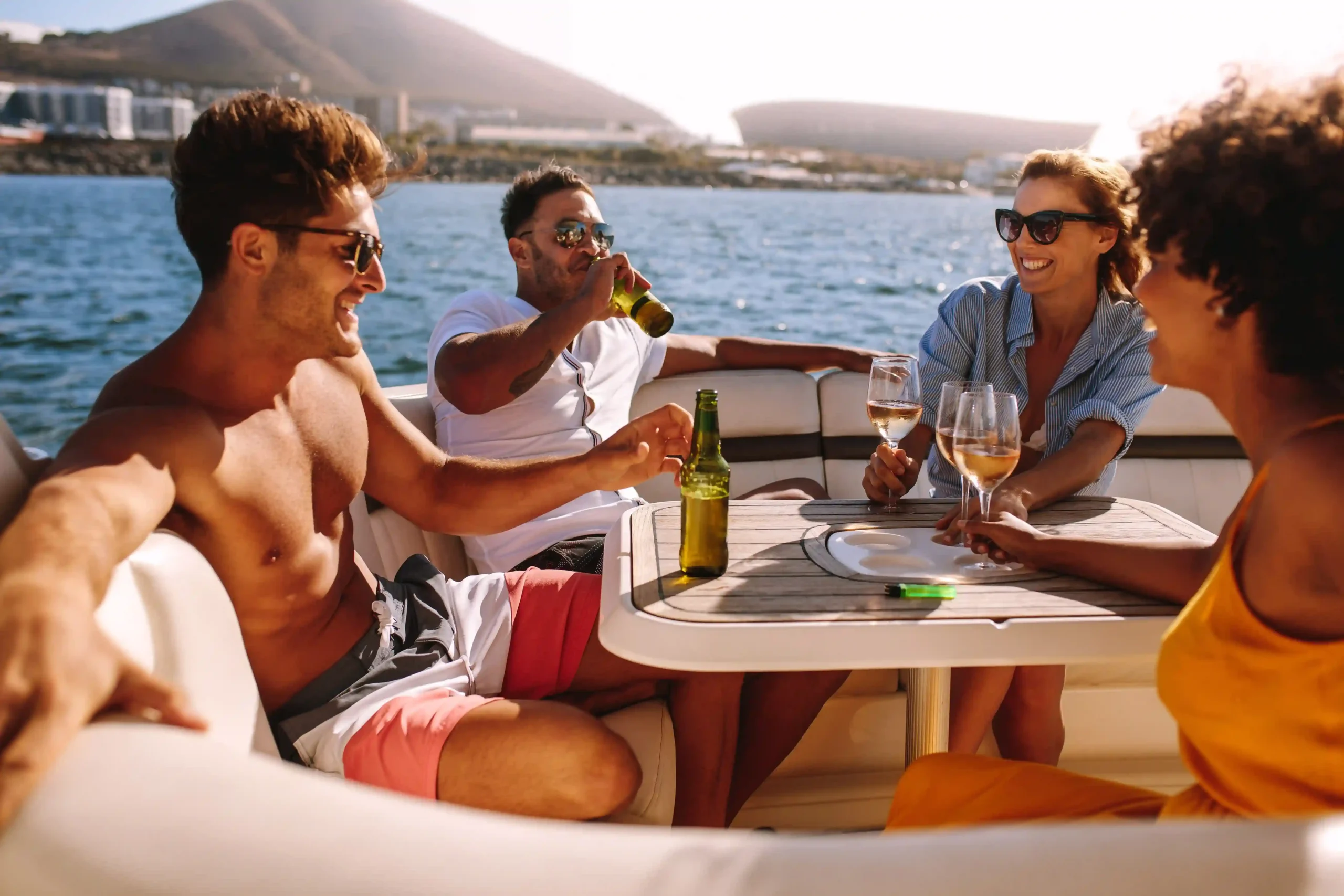
How Does the Effect of Alcohol While Boating Compare to Its Effect While on Land?

The sun is out, the water is calm, and the drinks are flowing. Boating and alcohol seem to go hand in hand—but does that drink hit harder on the water than it would at a backyard barbecue? How does the effect of alcohol while boating compare to its effect while on land? The difference isn’t just in your head.
The mix of sun, wind, and constant movement changes the way your body processes alcohol, making it feel stronger and impairing you faster. A drink that might leave you feeling relaxed on land can throw off your balance, slow your reaction time, and make minor missteps dangerous when you’re on a boat.
Before you take another sip, let’s talk about why this happens, what the law says, and why underestimating alcohol on the water is a mistake too many boaters regret.
Why Does Alcohol Feel Stronger While Boating?
Ever notice that a drink on a boat seems to hit faster than one on land? That’s not your imagination—it’s science. Boating puts your body through a mix of motion, heat, and constant adjustment, all while your brain works harder to keep you steady. Even if you’re just sitting back and enjoying the ride, your muscles and inner ear constantly make micro-adjustments to keep you balanced. Add alcohol to the mix, and everything slows down—your coordination, reaction time, and decision-making.
The U.S. Coast Guard calls this “boater’s fatigue.” The combination of sun, wind, vibration, and wave movement tires you out, even before you take a sip. That same drink that would barely register at a bar can leave you feeling lightheaded, unsteady, or completely impaired on the water. It’s why even experienced boaters can misjudge how much is too much—and why boating under the influence can become a disaster in seconds.
What Amount of Alcohol Consumed While Boating Is Equivalent to the Amount on Land?
Here’s the short answer: less than you think. Research shows that the effects of alcohol can nearly double when boating. A few drinks at a backyard cookout might make you feel relaxed, but those same drinks on the water can leave you lightheaded, off balance, and far more impaired than expected.
The combination of dehydration, motion, and constant sun exposure makes your body absorb alcohol differently. That beer or cocktail you’d handle fine at a bar can make steering, decision-making, or even standing up riskier when you’re out on the water. Many boaters assume they’re in control, only to realize too late that their reactions are slower, their judgment is off, and their ability to stay safe has been affected far more than expected.
Can You Drink on a Boat in Mississippi?
Can you drink on a boat? Yes—if you’re a passenger. Mississippi law doesn’t prohibit passengers from drinking alcohol while enjoying a day on the water as long as they’re not causing a problem or interfering with the person behind the wheel.
But if you’re the one driving, the rules change. Drinking and operating a boat is just as illegal as drinking and driving a car. Mississippi law sets the legal blood alcohol concentration (BAC) limit at 0.08%, and getting caught over the limit can mean fines, jail time, and even a suspension of boating privileges. Boating might feel more relaxed than driving, but once alcohol is involved, the law doesn’t make a distinction—and neither do the risks.
Can You Drink and Drive a Boat in Mississippi?
So, can you drink and drive a boat? No. Boating under the influence is illegal in Mississippi, and the consequences mirror those of drinking and driving a car. A boat operator with a blood alcohol concentration (BAC) of 0.08% or higher can face fines, jail time, and the loss of boating privileges.
Beyond the legal penalties, the risks speak for themselves. Alcohol slows reaction time, distorts depth perception, and makes it harder to judge speed and distance—dangerous conditions when operating a boat. Add unpredictable water conditions, weather changes, and other boaters into the mix, and an impaired driver becomes a threat to everyone on the water. Drinking on a boat might seem harmless, but once alcohol affects judgment and reflexes, even experienced boaters can make fatal mistakes.
What Mississippi Law Says About Drinking on a Boat
Boating in Mississippi comes with rules, and familiarity with them can mean the difference between a safe trip and serious consequences. Here’s what you need to keep in mind:
- Blood alcohol limit. Like driving a car, the legal BAC for operating a boat in Mississippi is 0.08%. Law enforcement will issue fines, impose potential jail time, and may revoke your boating privileges if your BAC exceeds the legal limit.
- Implied consent. If law enforcement suspects you’ve been drinking, you’re required to take a BAC test. Refusing isn’t a way out—it comes with its own penalties.
- Penalties for boating under the influence (BUI). A first offense can result in fines, but repeat offenses or accidents caused by alcohol use can mean time behind bars and harsher penalties.
These laws don’t just apply to large motorboats—sailboats, jet skis, and even smaller watercraft fall under the same regulations. If it moves on water, the same rules apply.
Injured by a Drunk Boater? Smith & Holder Can Help
Boating and alcohol don’t mix. If someone else made that mistake and it led to your injury, the law is on your side. Whether a reckless boater caused a crash, an impaired driver sent you overboard, or an accident left you with medical bills you shouldn’t have to pay, you have the right to take action.
Smith & Holder, PLLC holds intoxicated boaters accountable. Our team understands Mississippi law, how these cases play out, and what it takes to secure the compensation you need to recover. Injuries from boating accidents can be just as serious as car crashes, and the financial impact is no different. Don’t let someone else’s poor decision ruin more than your day—call us now to talk about your case.

